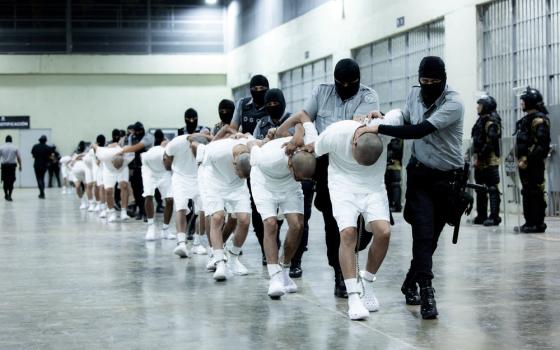By JOHN L. ALLEN JR.
New York
Italy has recently been gripped by a national drama over right-to-die issues reminiscent in some ways of the Terry Schiavo case in the United States – and once again, the Catholic Church has taken a strong position seen as a principled defense of the right to life by some, as insensitivity to human suffering by others.
The case of Pierluigi Welby, an advanced muscular dystrophy patient who died on Dec. 20 after being removed from a respirator, illustrates the particularly difficult nature of right-to-die cases. Both sides claim to act in defense of human dignity – the protection of human life at vulnerable moments, versus the desire to allow people to die with dignity.
As in the Schiavo case, the debate surrounding Welby also marks another milestone in the Catholic Church’s efforts to spell out the implications of its traditional distinction between “ordinary” and “extraordinary” therapies, the former being obligatory and the latter optional, in the face of an ever-expanding scientific capacity to sustain life. With Schiavo, the church took the position that the provision of food and water, even through a feeding tube, can never been seen as “extraordinary;” in the Welby case, it appeared to take a similar stand with respect to the use of a respirator when the patient would otherwise remain alive and, at least to some degree, functional.
Unlike Schiavo, Welby was lucid and even eloquent up to the very end, using a small stick to peck out blog entries pleading for the right to die. Recently he published a book about his situation, titled plaintively, “Let Me Die!”
Welby, who suffered from muscular dystrophy for 40 years, was unable to speak, eat or breathe on his own. He died on Wednesday, Dec. 20, after his anaesthetist gave him sedatives and removed the respirator which had been keeping him alive for the past five years. The anaesthetist, Mario Riccio, acted at Welby’s specific request.
A secular funeral ceremony was held for Welby in Rome on Dec. 24. It did not take place in a church, after Cardinal Camillo Ruini, the pope’s vicar for the Rome diocese, ruled that Welby was not eligible for a Catholic burial. The refusal was widely seen as the church’s final sign of disapproval after a long battle over Welby’s efforts to end his life.
The Vicariate of Rome issued a statement saying that Welby’s “will to end his life was known, as it had been repeated and publicly affirmed, in contrast to Catholic doctrine.”
The funeral was held instead outside Welby’s Rome parish, with some in the crowd of several thousand chanting “shame, shame!” in reference to the refusal of a religious ceremony. The pastor had originally agreed to officiate at the funeral, but was overruled by Ruini.
The decision drew special criticism in the Italian press given that two weeks earlier, on Dec. 12, Chilean Cardinal Francisco Javier Errazuriz had celebrated a funeral Mass for Gen. Augusto Pinochet, widely regarded as responsible for thousands of deaths and other human rights violations following a military coup.
Welby’s 91-year-old mother declared: “They (the Church) continue to insult him after his death.”
Even a bishop expressed doubts about the decision to deny Welby the burial rites.
“I read that in the last 20 minutes (Welby) ... asked God to forgive him. Even the doubt that this happened should induce the church to allow a Catholic funeral,” said Alessandro Maggiolini, the emeritus Bishop of Como.
Much of the public activism surrounding the Welby case was organized by Italy’s small “Radical Party,” which has long campaigned for a secular state independent of the church. The case spilt Italy’s ruling center-left government, with some ministers supporting Welby’s request, while others insisted that the state could not recognize what amounted to euthanasia. The conservative opposition, meanwhile, has called for Riccio to be prosecuted.
At the moment, prosecutors in Rome are reviewing the case to determine if Riccio should face criminal prosecution, given that euthanasia is punishable by ten to fifteen years in prison.
Welby’s case has been front-page news in Italy since last September, when Welby wrote to the Italian government asking for permission to have his respirator removed, arguing that prolonging its use when he stood no reasonable chance of recovery amounted to a sort of torture.
“I find the idea of dying horrible,” he wrote. “But what is left to me is no longer a life.”
An Italian court ruled in early December that Welby theoretically had the right to refuse use of the respirator, but that this right could not be exercised because there is no specific legislation governing such cases. Italian law recognizes a right of patients to refuse treatment, but also requires doctors to do everything possible to keep them alive.
Earlier, Italy’s Supreme Health Council, which advises the health ministry, found that the respirator could not be considered “aggressive” or “disproportionate.”
Benedict XVI has indirectly commented on the case twice in recent days. On Christmas eve, the pope said: “The birth of Christ helps us to understand how much value human life has, the life of every human being, from its first instant to its natural sunset.” Then on Christmas day, the pope added, “What are we to think of those who choose death in the belief that they are celebrating life?”
Cardinal Javier Lozano Barragan, the Vatican’s top official for health issues, said that the Catholic church would permit the discontinuation of a respirator only under extremely limited conditions.
“Is the sole purpose only to prolong the death throes?” Barragan told the Associated Press. “If the answer is ‘yes,’ then you can remove the respirator. If the answer is ‘no,’ then you cannot.”




